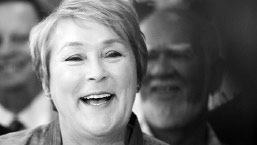Re:United Quebec
 CREDIT: CBC.CA
CREDIT: CBC.CAPauline Marois won the September 4 election to become Quebec's new Premier.
The Quebec provincial election results will have far-reaching effects on all of Canada — particularly Ontario, as the two provinces jointly contain two-thirds of Canada's population.
The student riots in Montreal bolstered support for the Parti-Quebecois candidate Pauline Marois and swept Premier Jean Charest's foundation away. In May, Premier Charest took a hit to his credibility when the province's education minister, Line Beauchamp, stepped down after being unable to negotiate an agreement with the leaders of several student groups prominent in the riots. This was followed by an underwhelming campaign hampered by concerns about student protestors potentially disrupting the Premier's appearances.
Marois was polling well all the way into the election and managed to secure a minority government in the province with 59 seats. Her leadership will be a significant change of direction for a province that struggles with corruption on a broad enough scale to require a provincial inquiry. Within 100 days of being elected, Marois promised she will abolish the tuition increase and commence an alternative process to examine the issue. To add a degree of accountability, she also committed to limiting tuition increases to not exceed the rate of inflation.
Entering the election, it's been readily apparent that Marois is interested in bringing back the traditional values of the Parti Quebecois, even proposing to ban head coverings in the public sector workforce. Her campaign alienated a huge population of citizens who've become the driving force for social and economic evolution in the province. Those she alienated, however, are a minority in comparison with the provincially oriented citizens who've grown accustomed to superior healthcare and heavily subsidized post-secondary education.
Charest painted the opposition with a broad brush, insinuating that they're just varying degrees of separatists while promising to clean up the province and tackle economic issues. While being founded on solid, sound principles, Charest's campaign held little appeal to one of the most vocal groups in this election: students. Students are a diverse group with an excellent grasp of popular culture, social media and expendable resources. In an effort to assert himself, Charest failed to come to an agreement with student groups. The result was escalating unrest and the introduction of Bill 78, a blunder that contributed to costing him the election. For many in Quebec, Charest was a symbol of the failure to negotiate and that stayed true on the campaign trail.
The election results have a huge impact on the future of Quebec as a province and as part of Canada. Marois promised to infuse several social programs with government money, leading to the question of where she plans to find that money. The minority government requires cooperation to sustain, something all too rare in politics, particularly in Quebec. The divisiveness on the campaign trail may well haunt Marois through her term since the opposition will have little interest in working with her. With one candidate pushing an agenda of cooperation and fiscal responsibility and the other promising rebates and tax cuts, the decision was an easy one to make for Quebec voters.
Editorial opinions or comments expressed in this online edition of Interrobang newspaper reflect the views of the writer and are not those of the Interrobang or the Fanshawe Student Union. The Interrobang is published weekly by the Fanshawe Student Union at 1001 Fanshawe College Blvd., P.O. Box 7005, London, Ontario, N5Y 5R6 and distributed through the Fanshawe College community. Letters to the editor are welcome. All letters are subject to editing and should be emailed. All letters must be accompanied by contact information. Letters can also be submitted online by clicking here.













